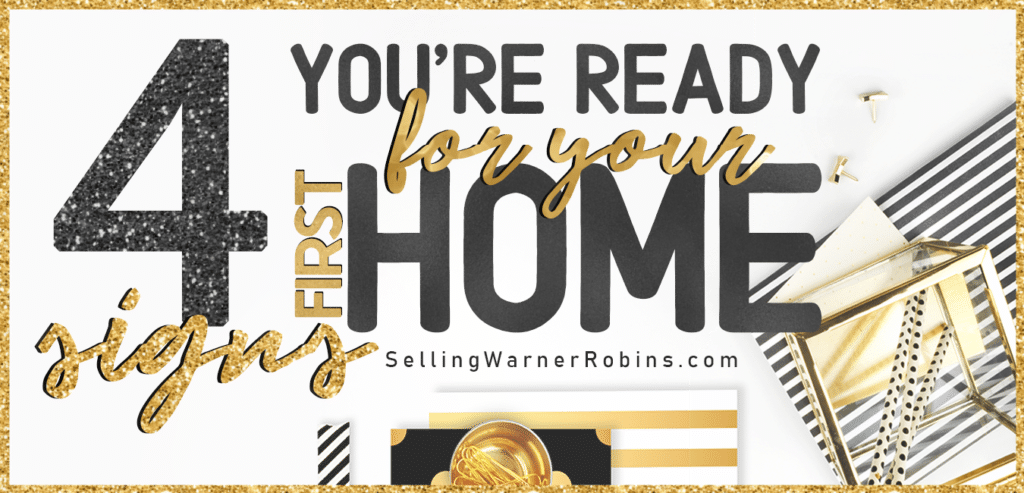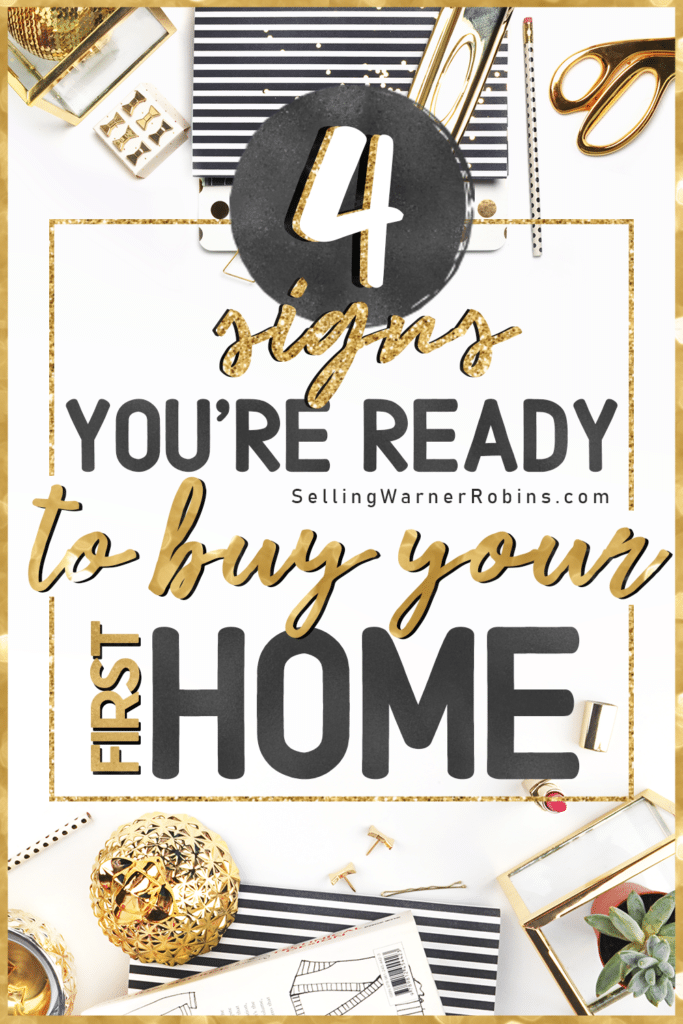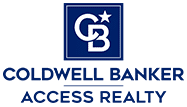4 Surefire Signs You Are Ready To Buy Your First Home

Buying your first home is a huge investment! Are you ready to buy your first home? You should be absolutely sure that it’s the right decision for you. And, when you take into consideration the current state of the economy and changes regarding real estate due to COVID-19, the task of home buying can seem extra daunting.
It’s important to note though, that as the saying goes: timing is everything! Right now, mortgage rates are low, encouraging more people to buy a home which may entice you to dip your toe into the market. However, there are plenty of other factors besides interest rates alone that should go into your decision as to whether or not you should start your journey into home-ownership. If you’re weighing the pros and cons of home-ownership, take a look at the following surefire signs that you are ready to buy your first home:
Your Finances Have Been Prepped
Did you know that just as much effort should be put into your prepping your finances as you put into your house search? Making sure your finances are in pristine condition will be a big help when it comes to getting approved for a mortgage.
When you get pre-approved for a mortgage, you will need to undergo a credit history check. This will include imperative information on your debt, like who you owe, how much you owe, how much you have paid and how you have paid. In other words, a credit history report informs lenders on if you were on time with payments, if you were late with payments or if you did not pay at all. This is obviously very important for your trustworthiness as a borrower.

Within your report, you will be assessed based on several different criteria. One of the most important components of the report is your overall credit score. This three-digit number is a clear cut indicator of how risky it is for a financial institution to approve you for a loan. A higher credit score can give you plenty of perks when it comes to getting a loan, like lower interest rates and more money to allocate toward your home in the first place.
A common misconception about what is in your credit score is that it contains personal information like your income, address, specific details such as your age, race, gender and marital status, or whether or not you use a credit counseling service. In fact, your credit score will only factor in any and all financial information you have acquired over the years. Here are some specific things lenders look at when determining your creditworthiness:
- Payment history: this accounts for 35% of your score, making it the most important to keep in mind when trying to sustain a healthy score; make sure you are paying your bills on time and in the right amount!
- Amounts owed: this is an accurate representation of your current debts; credit card debt is the most influential in this category, so avoid maxing out any of your accounts
- Credit history: the time you have been using your credit is most major in this aspect and accounts for 15% of your overall score; some things to consider are how long ago you opened your newest account, how long you have had your oldest account and the average amount of years the accounts of your credit have been open
- Credit mix: this refers to the variety of credit you have; this includes credit cards, car loans or mortgages to ensure you’re able to balance a healthy amount of debt
- New credit: any new applications you have filed for different sources of credit will appear here; you should avoid asking for too much credit if you’re seeking a large loan like a mortgage as you will appear much riskier to lenders
Once you understand the ins and outs of your finances, you will be better prepared to take on a massive responsibility such as a mortgage. Without accomplishing this key step, you may be more likely to default on your loan. By setting yourself up for success well in advance, you will likely thrive in home-ownership. Knowing you are ready to buy your first home and taking the necessary steps to qualify for a mortgage will set you on the right course towards owning a home.
You Know How Much You Can Afford
Having a rough idea of what you can afford is essential when you look for your first house. If you’re looking for homes outside of your price range, you will set yourself up for a loss right from the get-go. Luckily, there are a few strategies you can use that will help you learn about how much you can afford.
The first is by getting pre-approved for a mortgage. This differs from your pre-qualification and approval and doesn’t guarantee you get a mortgage through that specific lender. Many homes also need you to be pre-approved before you can do a walk through anyways since the seller is only interested in entertaining offers from people who take the home buying process seriously.
You can reach out to an online lender for your first pre-approval to get a good concept of your financial limits, but be sure to talk to other lenders about what options may be available to you. Many times when people get pre-approved for a mortgage, they are boxed into specific categories due to their lack of credit or cash available for a down payment. Therefore it’s crucial that you do a little research of your own.
There are two different types of loans that you will likely contemplate when buying your first home. The first is an FHA loan. This type of loan is insured through the Federal Housing Administration which in turn allows the lender to accept people from all sorts of different financial situations. FHA loans typically have less strict requirements, like a credit score as low as 580 and a down payment of only 3.5% of the total cost of the home. You can also bypass private mortgage insurance (PMI) fees with this type of loan as well. Have a first-time buyer budget in-place and you will be better prepared for any unforeseen issues or financial items that pop up.
The second type of loan you may be eligible for is a conventional loan. These loans are much more competitive in the real estate market when a seller considers offers. If you’re buying a home in a seller’s market, this may be your best bet at succeeding in your quest for home-ownership. One important thing to note though is stricter specifications to qualify. For a conventional loan, you will need a credit score of 620.
While many people believe that this type of loan necessitates a down payment of at least 20%, conventional options actually may only demand as low as 3%! The issue with conventional loans though is that you must pay PMI until 20% of the home is paid off. Also, your home is used as collateral if you default on your loan. Since your mortgage is not insured by the FHA, you will have few options other than your home going into foreclosure if you miss the 120 day period of missing payments.
You Have Found A Realtor
Finding a Realtor is no easy task. They should be knowledgeable of the area you are looking in, observant of key issues you may encounter in a home and always keep your best interest at the forefront of your search. While you may think it’s impossible to find all of these qualities in a Realtor, luckily, there are some ways you can better approach the task. The last thing you want when you are ready to buy your first home is to not find a real estate agent you can trust in to help you with all the steps necessary to own your first home.

First things first, doing research about what a local Realtor does will help you set realistic expectations for your relationship. And, believe it or not, there’s a big difference between someone who can buy and sell real estate with their license and a Realtor who is certified by the National Association of Realtors (NAR). Those who have achieved Realtor status have gone through rigorous training, continued education classes and must follow an official code of ethics and standards of practice. While you can still hire someone who has received their real estate license and is an agent, using someone who is a Realtor can give you an edge over the competition.
Next, understand what the responsibilities of your Realtor actually are. Your Realtor will act as your coordinator, negotiator and advocate, ensuring that they will always act in your best interest. Remember, your Realtor will be speaking on your behalf during the buying process, so choosing someone you trust is essential. While the process may differ from what you have seen on TV, your Realtor is there to help you with important steps for the transaction to help it run smoothly and be available for any questions you may have along the way.
Finally, learn more about the best ways to find the perfect Realtor. Get referrals from friends and family who have worked with professionals before and have had a great experience. You can also research potential candidates by checking out their website, blog and social media to get a better idea of how they will engage with you as a client. Interviewing is a great way to get to know someone, especially if you’re entrusting them with sensitive financial information like your income and the amount of debt you have.
At the end of the day though, you will have to rely on that gut feeling and go with your instincts. Overall, you will get a general idea of how well you and your Realtor mesh after a couple of meetings. If you feel that something is off, don’t be afraid to say something! Saying no to something that doesn’t feel right will ultimately help you in your home search.
You Have The Future In Mind
You may already have a thought of where you want to live, but before you buy a home, it’s vital to compare home prices in the area. By keeping an eye on up and coming neighborhoods, you will be better prepared for what to expect down the road. This will give you a picture of what your resale potential is like when it comes time to sell. While living in your home, you may improve the value of your home through renovations — just be sure you’re not overspending so you’re able to recoup the majority of your losses! Using an updated home property report will help you save money in the long run and set you up for success for any future endeavors you want to make.
You should also compare other details about the neighborhood that will affect your quality of life. On many real estate listing sites, there’s a plethora of information distinct to the area you consider living in. You can get a more accurate estimate of things like crime, the quality of schools nearby and the walkability of an area. While you may be single without kids when you buy your first home, if having a family is on your checklist it could be good to look for somewhere you can grow into. Or, if you prefer a starter home, the school district may be less important to you than it will be down the line. Just understand that this will likely require a move sooner rather than later.
Perhaps most importantly though, you can get an accurate list of previous home buying costs associated with that specific property. This can include average mortgage payments, utility or insurance expenses and property taxes. Keep a keen eye on what the home is assessed for. If the home has not been assessed in several years and the perceived value of the property is selling for much more, then you can almost certainly guarantee that your taxes will go up which will ultimately affect how much house you can afford.
Final First Time Home Buyer Tips
The home buying process can be a lengthy endeavor, full of ups and downs. You may fall in love with a home only to have it snatched away due to the increasingly competitive atmosphere of the real estate market. But, no matter how much stress and frustration you experience during the home buying process, the rewards you will reap will be even more noteworthy.
Be steadfast in your search and remember that whichever house you choose to go with, the freedom to choose how you like to live will always make it feel like home! Happy house hunting and advance kudos to owning your very first home.
if you found this article that delves into if you are ready to buy your first home, and the steps necessary to do so, please share this article so other real estate consumers can also benefit from the information.
Are You Ready to Buy Your First Home?
About Anita Clark Realtor
Anita Clark has written 670 posts on this blog.
by Anita Clark Anita is a residential Real Estate Agent in Warner Robins Georgia, with Coldwell Banker Access Realty (478) 953-8595, aiding buyers and sellers with all their real estate questions on her Warner Robins blog.




